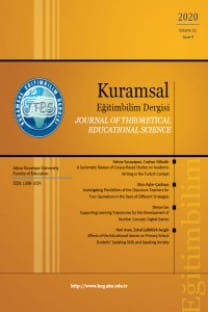Mediational moves and reciprocity behaviors in face-to-face and mobile-assisted dynamic assessment
Mediational moves and reciprocity behaviors in face-to-face and mobile-assisted dynamic assessment
Dynamic assessment mobile-assisted language learning, mediational moves, reciprocity behaviors,
___
- Ableeva, R. (2010). Dynamic assessment of listening comprehension in second language learning [Unpublished doctoral dissertation]. The Pennsylvania State University.
- Ableeva, R., & Lantolf, J. (2011). Mediated dialogue and the microgenesis of second language listening comprehension. Assessment in Education: Principles, Policy & Practice, 18(2), 133-149. https://doi.org/10.1080/0969594X.2011.555330
- Andujar, A. (2020). Mobile-mediated dynamic assessment: A new perspective for second language development. ReCALL, 32(2), 178-194. https://doi.org/10.1017/S0958344019000247
- Best, J. W., & Kahn, J. V. (2006). Research in education. Pearson.
- Chinnery, G. M. (2006). Going to the MALL: Mobile assisted language learning. Language Learning & Technology, 10(1), 9-16. http://dx.doi.org/10125/44040
- Çakmak, F. (2019). Mobile learning and mobile assisted language learning in focus. Language and Technology, 1(1), 30-48.
- Çetin-Köroğlu, Z. (2019). Interventionist dynamic assessment's effects on speaking skills testing: Case of ELT teacher candidates. Advances in Language and Literary Studies, 10(3), 23-31. https://doi.org/10.7575/aiac.alls.v.10n.3p.23
- Davin, K. J. (2013). Integration of dynamic assessment and instructional conversations to promote development and improve assessment in the language classroom. Language Teaching Research, 17(3), 303-322. https://doi.org/10.1177/1362168813482934
- Ebadi, S. (2016). Mediation and reciprocity in online L2 dynamic assessment. CALL-EJ, 17(2), 16-40.
- Ebadi, S., & Latif, S. V. (2015). Dynamic assessment of EFL learners' listening comprehension via computerized concept mapping. Journal of Educational Technology, 12(2), 29-41.
- Ebadi, S., & Rahimi, M. (2019). Mediating EFL learners’ academic writing skills in online dynamic assessment using Google Docs. Computer Assisted Language Learning, 1-29. https://doi.org/10.1080/09588221.2018.1527362
- Ebadi, S., & Saeedian, A. (2016). Planning future instructional programs through computerized L2 dynamic assessment. Teaching English with Technology, 16(4), 12-32.
- Ebadi, S., Weisi, H., Monkaresi, H., & Bahramlou, K. (2018). Exploring lexical inferencing as a vocabulary acquisition strategy through computerized dynamic assessment and static assessment. Computer Assisted Language Learning, 31(7), 790-817. https://doi.org/10.1080/09588221.2018.1451344
- Hsu, L. (2013). English as a foreign language learners’ perception of mobile assisted language learning: A cross-national study. Computer Assisted Language Learning, 26(3), 197-213. https://doi.org/10.1080/09588221.2011.649485
- Kang, H. S. (2010). Negative evidence and its explicitness and positioning in the learning of Korean as a heritage language, The Modern Language Journal, 94(4), 582-599. https://doi.org/10.1111/j.1540-4781.2010.01093.x
- Lambert, V. A., & Lambert, C. E. (2012). Qualitative descriptive research: An acceptable design. Pacific Rim International Journal of Nursing Research, 16(4), 255-256.
- Lantolf, J. P., & Poehner, M. E. (2004). Dynamic assessment of L2 development: Bringing the past into the future. Journal of Applied Linguistics, 1(1), 49-72. https://doi.org/10.1558/japl.v1i1.647
- Lantolf, J. P., & Poehner, M. E. (2011). Dynamic assessment in the classroom: Vygotskian praxis for second language development. Language Teaching Research, 15(1), 11–33. https://doi.org/10.1177/1362168810383328
- Lidz, C. S., & Gindis, B. (2003). Dynamic assessment of the evolving cognitive functions in children. In A. Kozulin, B. Gindis, V. S. Ageyev, & S. M. Miller (Eds.), Vygotsky’s educational theory in cultural context, (pp. 99-116). Cambridge University.
- Lyster, R., & Saito, K. (2010). Oral feedback in classroom SLA: A meta-analysis. Studies in Second Language Acquisition, 32(2), 265-302. https://doi.org/10.1017/S0272263109990520
- Merzifonluoğlu, A., & Tulgar, A. T. (2022). Are digital technologies effective for the improvement of L2 vocabulary at tertiary level?. The Reading Matrix: An International Online Journal, 22(1). 56-72.
- Nassaji, H. (2015). Qualitative and descriptive research: Data type versus data analysis. Language Teaching Research. 19(2), 129-132. https://doi.org/10.1177/1362168815572747
- Pishghadam, R., & Barabadi, E. (2012). Constructing and validating computerized dynamic assessment of L2 reading comprehension. Iranian Journal of Applied Linguistics, 15(1), 73-95.
- Poehner, M. E. (2005). Dynamic assessment of oral proficiency among advanced L2 learners of French [Unpublished Doctoral Dissertation]. Pennsylvania State University.
- Poehner, M. E. (2008). Dynamic assessment: A Vygotskian approach to understanding and promoting second language development. Springer.
- Poehner, M. E., & Lantolf, J. P. (2010). Vygotsky's teaching-assessment dialectic and L2 education: The case for dynamic assessment. Mind, Culture, and Activity, 17(4), 312-330. https://doi.org/10.1080/10749030903338509
- Poehner, M. E., & Lantolf, J. P. (2013). Bringing the ZPD into the equation: Capturing L2 development during Computerized Dynamic Assessment (C-DA). Language Teaching Research, 17(3), 323-342. https://doi.org/10.1177/1362168813482935
- Prensky, M. (2001). Digital natives, digital immigrants. On the Horizon, 9(5), 1-6. https://doi.org/10.1108/10748120110424843
- Rassaei, E. (2021). Implementing mobile-mediated dynamic assessment for teaching request forms to EFL learners. Computer Assisted Language Learning, 1-31.
- Rezaee, A. A., Alavi, S. M., & Razzaghifard, P. (2019). The impact of mobile-based dynamic assessment on improving EFL oral accuracy. Education and Information Technologies, 24(5), 3091-3105. https://doi.org/10.1007/s10639-019-09915-1
- Sandelowski, M. (2000). Whatever happened to qualitative description? Research in Nursing & Health, 23(4), 334-340.
- Shrestha, P., & Coffin, C. (2012). Dynamic assessment, tutor mediation and academic writing development. Assessing Writing, 17(1), 55-70. https://doi.org/10.1016/j.asw.2011.11.003
- Sidnell, J. (2010). Conversation analysis: An introduction. Wiley-Blackwell.
- Siwathaworn, P., & Wudthayagorn, J. (2018). The impact of dynamic assessment on tertiary EFL students’ speaking skills. The Asian Journal of Applied Linguistics, 5(1), 142-155.
- Swain, M. (2001). Examining dialogue: Another approach to content specification and to validating inferences drawn from test scores. Language Testing, 18(3), 275-302. https://doi.org/10.1177/026553220101800302
- Tarighat, S., & Khodabakhsh, S. (2016). Mobile-assisted language assessment: Assessing speaking. Computers in Human Behavior, 64, 409-413. https://doi.org/10.1016/j.chb.2016.07.014
- Vygotsky, L.S. (1978). Mind in Society: The development of higher psychological processes. Harvard University.
- Yılmaz-Yakışık, B. (2012). Dynamic assessment of ELT students’ speaking skills [Unpublished Doctoral Dissertation]. Gazi University.
- Yılmaz-Yakışık, B., & Çakır, A. (2017). Dynamic assessment of prospective English teachers’ speaking skills. European Journal of English Language Teaching, 2(1), 22–53. https://doi.org/10.5281/zenodo.260205
- ISSN: 1308-1659
- Yayın Aralığı: 4
- Başlangıç: 2008
- Yayıncı: Afyon Kocatepe Üniversitesi Eğitim Fakültesi
İlköğretime erişimin mekansal bir analizi
Mustafa KÖSE, Cahit ERDEM, Mehmet KOÇYİĞİT, Mohammed Idris JEGA
Book Review: Teaching Turkish Grammar to Foreigners
Wurood Hashim Sahib ALTAAİ, Burcu GOKGOZ-KURT
Developing Adaptive Motivational Styles &Vision: A Model of Attribution Retraining in EFL
Öğretmen Adaylarının Kapsayıcı Eğitime Yönelik Farkındalıklarının İncelenmesi
University Students’ Levels of Well-Being, Social Media Usage, Self-Control, and Insomnia in Turkey
